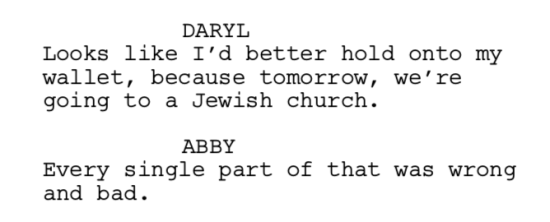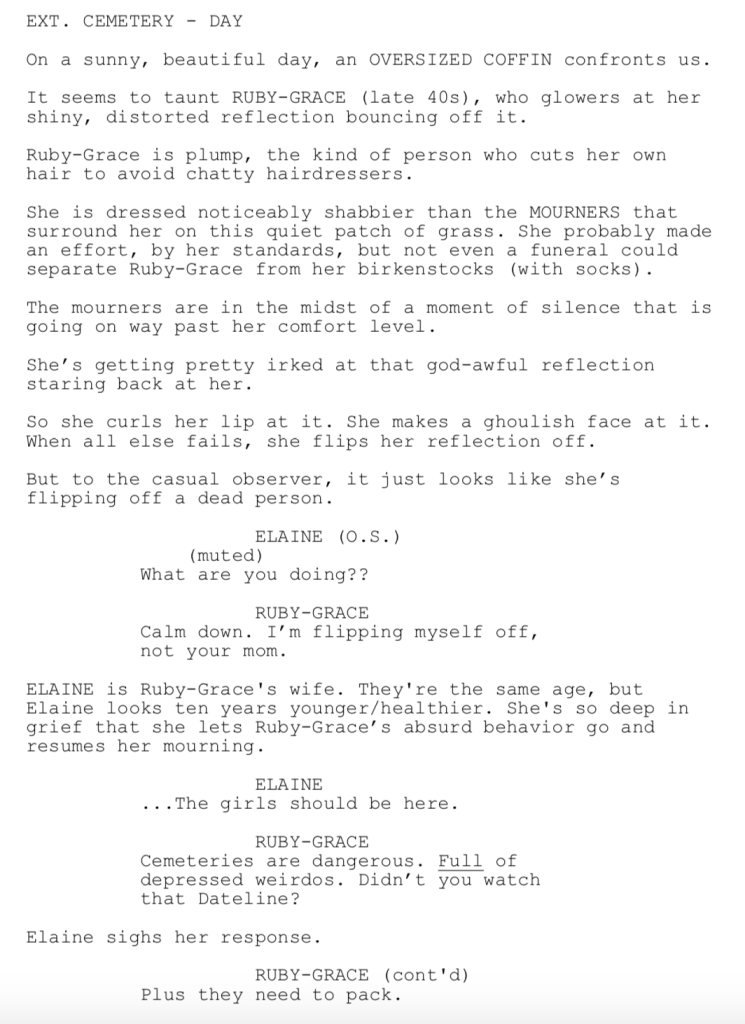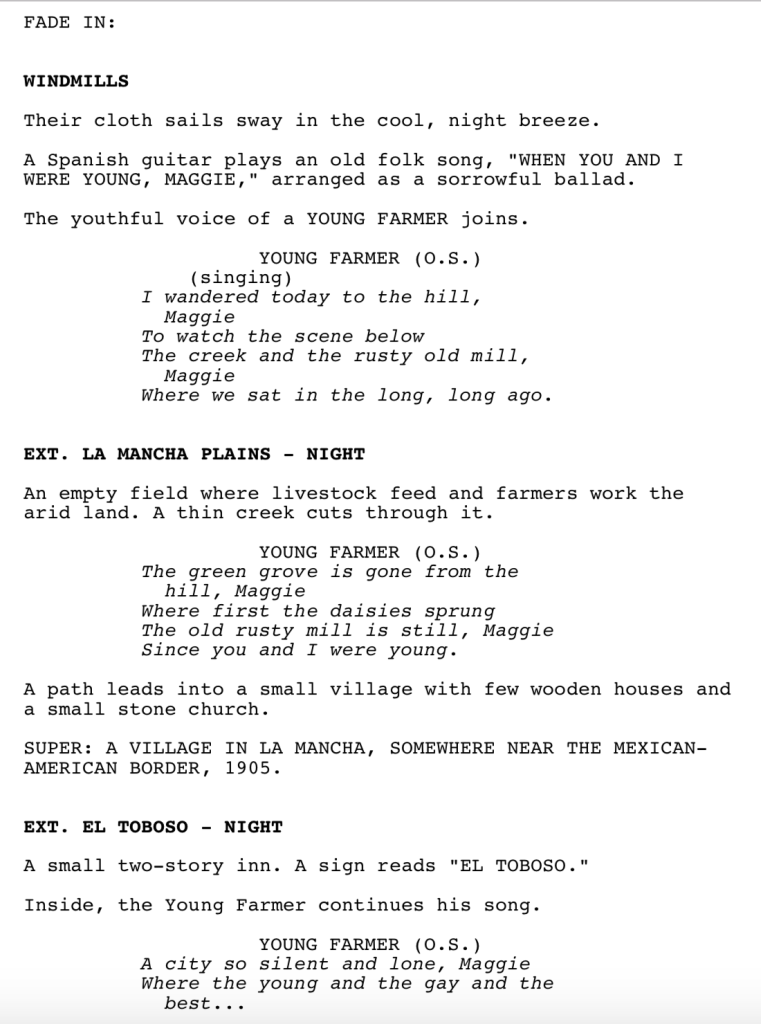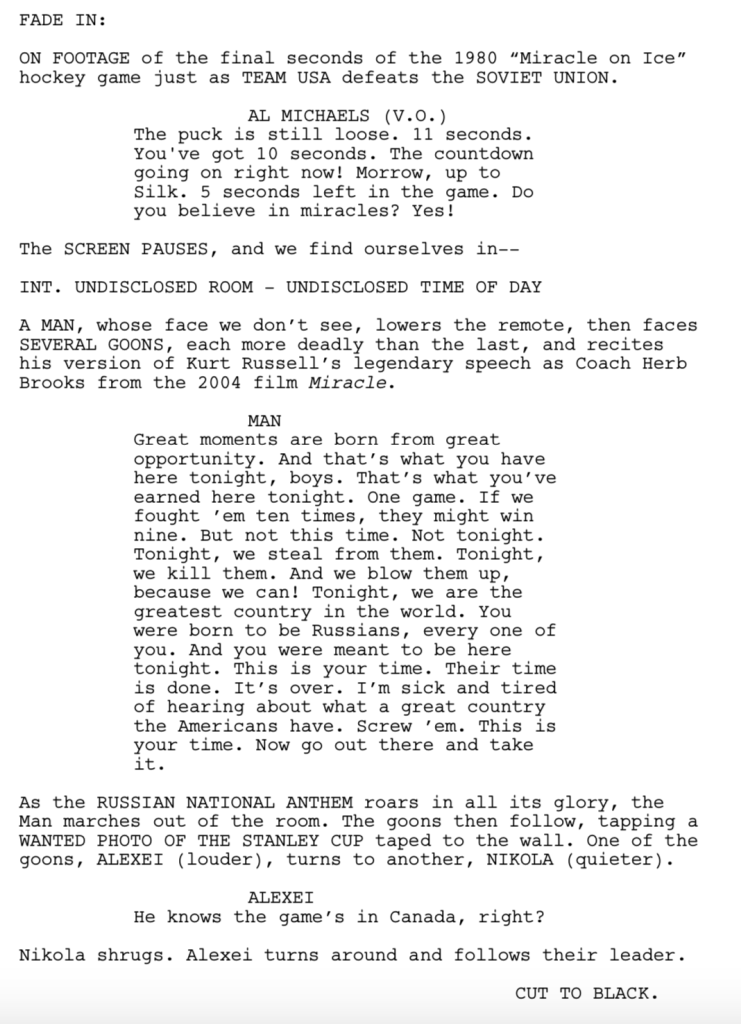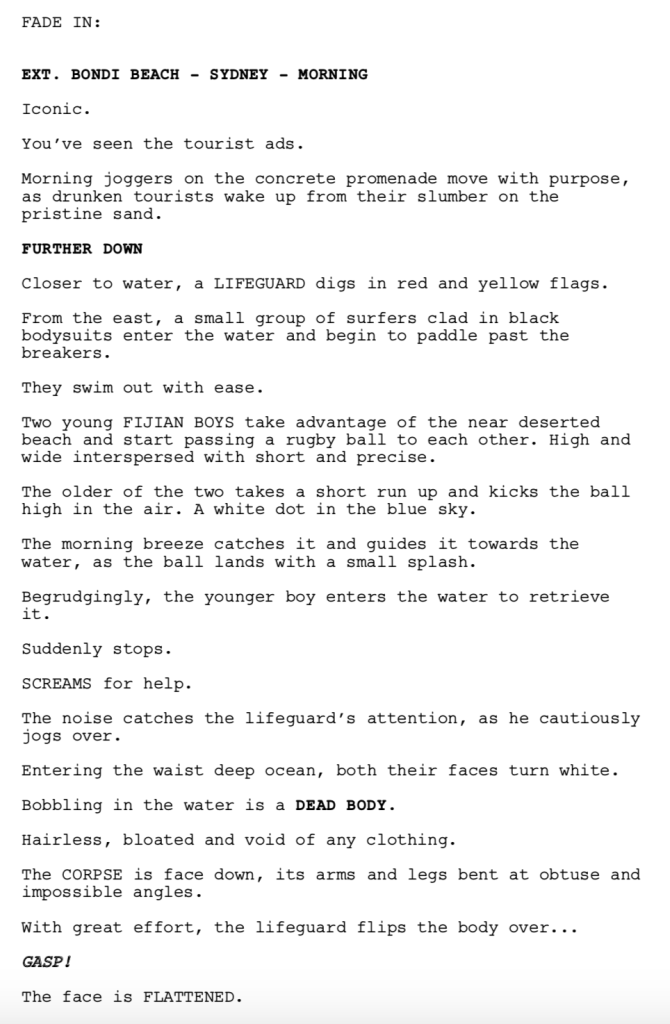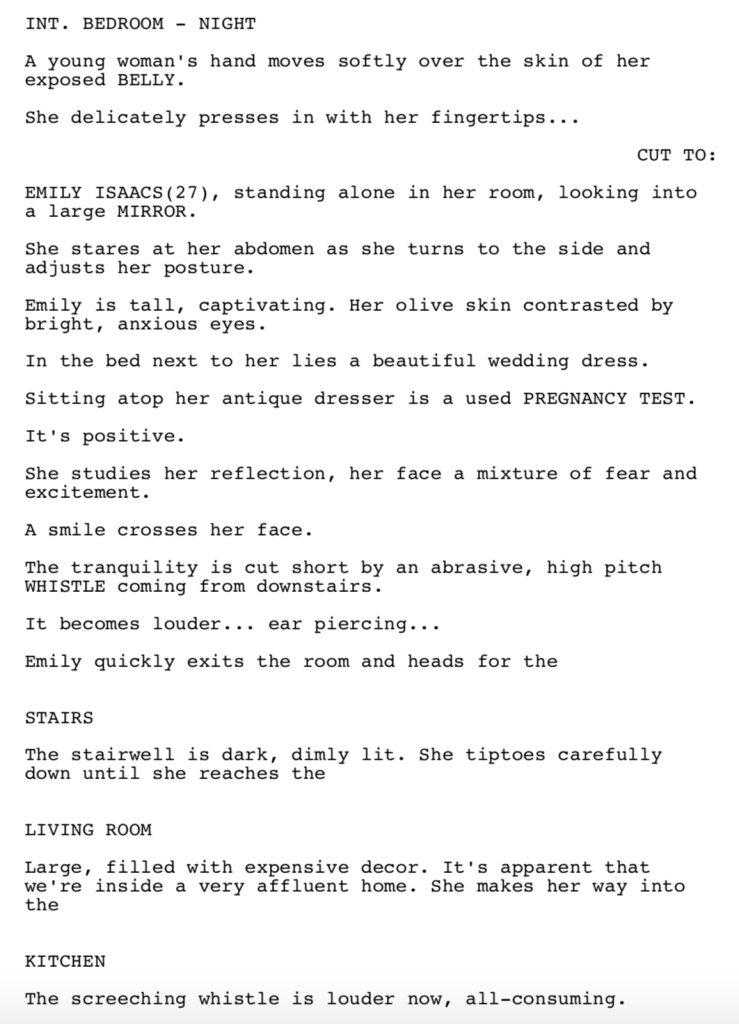I’m sure it’s frustrating going from screenwriting site to screenwriting site hearing that the ONLY way to break in is if you write “THIS” type of script. Does this sound familiar? “You have to write a biopic.” “You have to write the next Jane Wick.” “Your script has to have a social message.” “Don’t bother typing FADE IN unless you’re writing contained horror.” What if you don’t like those kinds of movies? Are you doomed? Or is there another way?
Oh yes. There’s another way.
I’m going to provide you with a hack that allows you to write about anything you want. And it’s surprisingly simple. What is it? Great characters. If we love or are fascinated by your characters, we won’t care what the movie is about. I’ll give you definitive proof of this. There’s a movie that came out in the 90s starring two nobodies by the names of Vince Vaughn and Jon Favreau. The movie was called “Swingers” and it would launch Vince Vaughn’s career as an actor and Favreau’s as a writer-director. But if you revisit Swingers, you’ll notice something strange. The movie has ZERO PLOT. It’s an absolute structural disaster. The characters go to parties, strike out with girls, then go on a Vegas road trip, have some adventures there, then come BACK to Los Angeles, go to more parties, strike out with more girls, then get in a random gun dust-up with gangsters, then play video games, then go to more parties and strike out with more girls.
The editor of this movie nearly quit because Favreau and director Doug Liman couldn’t convince him that the movie had a point. And yet, in spite of this, the movie turned out to be immensely enjoyable. Why? Because the characters were so great. Once a reader falls in love with a character (and preferably, with more than one of your characters), they stop judging the plot. They just want to be around those characters to see what happens to them. This is why you can point out a million plot holes in that movie your friend loves and they don’t care. They love the characters so much that the plot doesn’t matter.
You can use this same power to make readers forget about their biases, forget about the scripts they’re supposed to be looking for for their bosses, and even forget about the almighty dollar, which, in the end, is the ultimate deciding factor on whether to move forward with a project. Why? Because a great character doesn’t need a genre. A great character IS the genre.
So go ahead and write whatever you want IF, and only if, you have killer characters within your story.
How do you write killer characters? I dunno. Just, like, create someone interesting n stuff. I’m just kidding. There are eight character types that have a strong impact on the reader. But before we get to those, I first want to tell you what kind of character to avoid should you write something outside the mainstream. The big character you want nothing to do with is the internal character. This is the character who doesn’t say much, who keeps his thoughts to himself. These characters die on the page. There are ways to make them work, but it’s a lot harder. So if you want to write one of these characters, I’d recommend doing so inside one of the scripts Hollywood’s looking for. John Wick is a good example, actually. John Wick doesn’t say a whole lot. So if you put him in an indie drama, he’ll be boring. He only works because he’s shooting everybody who moves. As for who you do want to include, here are my suggestions…
The Motormouth – The character who says whatever’s on their mind all the time with no filter always pops off the page. We see it with Tony Stark. We see it with Juno. We see it with Clementine in Eternal Sunshine. These characters are not only fun to write, but readers are drawn to them.
The Voice Over Narrator – This is sort of an offshoot of the Motormouth, as narrators will tend to talk a lot as well. But the big reason these characters connect with readers is because we’re getting inside the character’s head, which is something we don’t often get to do in movies. Edward Norton’s character in Fight Club is a good example.
Wild Card Characters – These are characters who you’re never quite sure what they’re going to do next. And you have to write them that way. Where you’re literally getting into the reader’s mind and asking, “What does the reader think my character is going to do in this moment?” And then you make sure that that character never does that. On the villain side of the Wild Card Character, you have Hannibal Lecter. On the hero side, you have Captain Jack Sparrow. And on the comedy side, you have Alan from The Hangover.
The Fearless Character – Audiences LOVE fearless characters because we’re all drawn to bravery. But the great thing about fearless characters is that they charge towards danger and danger is where all the fun is. Meanwhile, fearful characters are hanging back, playing it safe and, therefore, not encountering as many potentially entertaining scenarios. On the blockbuster end for Fearless Characters, we have Ethan Hunt. On the indie end, Eighth Grade. Kayla is trying in every scene to put herself out there, be more brave, and she ends up being one of the most memorable characters of the year for it.
The Liar – Characters who lie a lot spend the majority of their movie inside dramatically ironic situations, which are reading-crack. Dramatically ironic situations are when we know our hero is lying and the other character does not. So we’re constantly wondering if they’re going to get caught. Melissa McCarthy just got an Oscar nomination for this type of character in Can You Ever Forgive Me?
Bats&%t Crazy Characters – Lay it all on the line and just throw a character out there who IS the movie. The crazier and weirder and more bats&%t the character is, the better. This is how Mel Gibson became a movie star (in Lethal Weapon). It is also how Tom Hardy became a movie star. He broke in with the character Bronson in “Bronson.”
Worst Circumstances Best Attitude – One of the most lovable types of characters in existence is the character who’s had a terrible life, who grew up in terrible conditions. Life has thrown nothing but lemons at him. And yet, he keeps charging forward with reckless optimism. These characters work because they remind us that our situations aren’t nearly as bad as we think they are and, no matter what, you can still find the positive in life. The most famous of these characters is, of course, Forrest Gump.
The Racist (or Sexist, or Bigot, or Homophobe) – A lot of people in the screenwriting industry believe that you can’t make your characters too bad. The flip side of that argument is that bad people tend to be the most interesting. The reason these characters really pull a reader in is because we want to see if they’ll be redeemed. There are tons of examples of this character type lighting up the page. Recently, we saw it with Tony Lip in Green Book. Then with Dixon (Sam Rockwell) in Three Billboards. And if you want to go back a ways, Melvin in As Good As It Gets.
You can mix and match these character types as well. You don’t have to pick just one. If you’re looking for a connection between all of them, you’ll notice they’re all either big or active or dealing with some major internal strife. And, of course, there are more character traits out there you can use. These are just eight of the bigger ones I see working time and time again. So if you’re tired of Hollywood telling you what to write, zoom in on a great character and write whatever the heck you want.
Genre: Horror
Premise: A recovering alcoholic travels off to his dead uncle’s remote island to battle the disease, but ends up battling a deadly monster who lives in the surrounding water instead.
About: Hooray! A recent spec sale. A few weeks ago, actually. And high six figures even. Never say the dream is dead. However, if you’re going to live the spec sale dream, you probably want to get your script to David Boxerbaum, as he’s the only agent in town the studios go to for original material. Peter Joseph sold this script to Universal.
Writer: Peter Joseph
Details: 105 pages
I’m doing this review for one reason and one reason only. Because I know that Grendl will post a 5000 word essay in the comments section on why it can never live up to its inspiration, Jaws.
There is a specific movie that brings all of us into this bizarre frustrating addictive craft known as screenwriting. And while we fight against copying the films of our past, an argument can be made that all we’re really trying to do is rewrite our favorite movie ever. Grendl knows Jaws so well, he can probably tell you the name of Extra #482 on the beach. So he can tell you how this script fares much better than I can.
I, however, am not bound by these chains. I’m easily entertained when it comes to monster movies. I’ll be the casual fan here and Grendl can be the New York Times critic.
30 year old Henry Wabash just got out of rehab. His sister, Athena, is proud of him, but worried that if she leaves him alone, he’ll relapse. That’s exactly what happens. Henry ends up at a bar his first night back. And so Athena comes up with a plan. She’s going to drive them out to their Uncle Pat’s place, which is located on a tiny island in the middle of a river way out in the middle of nowhere. There, Henry can fix up the house of their recently deceased uncle and truly put this addiction behind him.
After Athena leaves, the only connection to the outside world Henry has is Maurice, a local caretaker. Maurice is going to motor out and deliver him groceries every week. That way Henry won’t have any access to booze at all. One day, while out on the lake in a canoe, a rogue wave knocks Henry out of his boat. While underwater, he spots an old military plane at the bottom of the lake. Later, when Maurice comes by, he explains that the crew got out fine and it’s nothing. But it sure didn’t seem like nothing to Henry.
The next day, while out near the shore, a giant tentacle slips out of the water and tries to yank Henry in! He’s able to chop it off with an axe, but that’s not the end of it! The tentacle turns into its own entity and continues to attack Henry, who’s only barely able to kill it. Henry sends up a flare to have Maurice get him out of here, but on the way back, the tentacle creature attacks them! Not only that, but it seems to have grown! Henry is somehow able to escape but can only get back to the private island.
But if he thought he was safe there, think again! The sea monster is growing so rapidly that it’s able to squirm its tentacles up to and even INSIDE the house. It really wants to kill Henry. Henry realizes that if he doesn’t come up with a plan pronto, he’s going to be sea food. Ironically, Henry’s lone stash of liquor allows him to McGruber together a Molotov cocktail, which, theoretically, he’ll be able to use as a weapon. But this giant sea thing is getting smarter by the second. So whatever Henry’s plan is, it better be foolproof.
Let’s start off by recognizing the EXTREME streamlined writing style here. Pop open the first scene in Don’t Go In The Water and you won’t even see the right side of the page. That’s because there are no words on it. This script is written to read fast. And while I’m not sure a script should be THIS sparse, there’s an argument to be made that it should. All of Max Landis’s scripts read like this and he sold a bunch of stuff as well. Readers like effortless reading experiences and this script selling is proof of that.
Another takeaway is that monster-on-an-island specs are gonna sell at a higher rate than other specs. I know it’s simplistic. It almost seems like cheating. But we saw this with last year’s spec sale of Beast, about a woman running around an island with a beast creature. We saw an extreme version of it with The Shallows. The reason it works is because it hits all the beats that make for a thrilling experience. You’ve got a character who’s trapped. You’ve got a mysterious monster. And you’ve got time ticking down. As crazy as it is for me to say, I don’t think it’s a bad idea to write one of these. It’s sort of like a sneaky loophole to a spec sale. Sure, two of them are now in development. But any studio would like to make one of these because they’re so cheap.
As for the quality of the story itself, it had its pros and cons. I liked that Joseph attempted to explore something real with this character by making him an alcoholic. And I liked how organically that played into the plot itself. He had to come out here because it was his only shot at beating this. But I’m not sure Joseph ever really committed to it. There were times where he did and other times where Henry seemed like he wouldn’t know what alcohol was if a Budweiser hit him in the face. You probably need a writer who really understands addiction to do a pass on this storyline. Cause you can’t just dabble in addiction when its convenient. It’s supposed to be who your character is.
For that reason, I was only casually interested in the story. It was all too simplistic for my taste. However, after Maurice is killed and Henry is forced to flee back to the island, things picked up considerably. In any monster movie, one of the primary variables that you have to nail is the threat level of your monster. This is why Aliens remains one of the greatest monster movies ever made. When we see those aliens first attack the Marines, and they’re so overmatched, we think our heroes are done for, no matter what they do from now on. That’s the threat level you want to bring to your story – if not early, then by the midpoint.
Once I felt that Henry wasn’t safe in his own house, that he didn’t have any way to communicate with the outside world, and that any attempt to use the water for escape was suicide, I became a lot more invested. That final 40 pages is when this script delivered. So it’s by no means a killer screenplay. But once it hits the home stretch, you leave feeling like you got your money’s worth.
[ ] What the hell did I just read?
[ ] wasn’t for me
[x] worth the read
[ ] impressive
[ ] genius
What I learned: Alcoholism is everywhere in movies and TV. For this reason, it usually comes off as cliche. The reason for that is writers think that to convey alcoholism you have to show the character drinking. A lot. The more they’re drinking, the belief is, the more developed the character becomes. In actuality, they’re just feeding the cliche. To accurately convey alcoholism, focus more on NOT HAVING THE DRINK. It’s the moments between drinks – the struggle – that’s where you explore true addiction.
Genre: Comedy
Logline: (from Hit List) Abby hosts a popular true crime podcast about a brash blue collar troublemaker named Daryl, who she believes was wrongfully convicted of murder. But when Daryl breaks out of prison and shows up at her apartment, she goes from podcaster to accomplice as the unlikely pair team up to try to exonerate him before he’s caught.
About: I picked this script from the 2018 Hit List when I saw that the writers had sold another script called “Haunted Haunted House.” I thought that was hilarious. The writers started their career writing for College Humor, where they won numerous Emmys, and most recently wrote for Last Week with John Oliver. This film is set to star Awkwafina as the podcaster and Ike Barinholtz as the escaped convict.
Writers: Dan Gurewitch & David Young
Details: 110 pages
Let’s start today’s review with a Scriptshadow PSA. Your comedy spec should be between 100-110 pages. If you are outside this page count window, your screenplay will be terminated by the Scriptshadow Incinipager 11,000. Thank you for listening. Have a nice day.
You may be asking why I’ve yet again ventured into comedy territory with today’s script. The last time I gave a good review to a comedy was back in the 70s with Smokey and the Bandit. Ah, it feels like yesterday when Burt Reynolds signed up for the role of Smokey off the buzz from my script review. Or was it the Bandit? Who’s keeping track? All I know is that if you want something in this world, you have to will it into existence. I want to laugh during a screenplay again. And so it shall be!
Ultra liberal Abby Parrish had it all – the number one podcast in the world, fans hanging on her every word, late night talk shows touting the addictive nature of Crime after Crime. Every week, Abby would delve deeper into the murder of Tom Hutcherson, a simple man who was stabbed 17 times behind a bar and left for dead.
Earlier that night, everyone saw Tom fighting with his dimwitted overweight law-breaking brother, Daryl. So it must have been him who murdered Tom! That’s what the courts said. But Abby ripped open every crevice of the case to prove that Tom was innocent. Except she never proved anything either way, leaving a rabid fanbase to turn on her for wasting dozens of hours of their lives.
Lucky for Abby, she’s getting a shot to finally put the nail in the coffin. Or… take.. the nail out of the coffin? When there’s a blackout at the local prison, Darryl, in all his white-trash glory, figures he should make a run for it. He, of course, runs straight to Abby’s, just as she’s about to have sex for the first time in 3 years. The uptight Abby is NOT cool with Darryl crashing her sex party. But then she realizes she can finally give her audience what they’re looking for – an ending.
She agrees to help Darryl find out who really killed his brother and they figure the best course of action is to steal Tom’s phone from police evidence and see who he was calling that night. After successfully pulling the phone heist off, they find a bunch of calls placed to Temple Beth Israel Synagogue, which is strange because Tom was Catholic. They go there and talk to a shifty guy named Spencer, who says that, “Oh yeah, he used to do landscaping work for us.” It’s all a bit shady but when they look deeper into Spencer, he checks out.
Next up is Darryl’s ex-girlfriend’s new boyfriend, Gene, as Darryl has concocted a theory whereby Gene has been planning for years to steal Darryl’s girlfriend and figured out the best way to do it was to kill Tom and frame Darryl for it! Abby doesn’t go with him on this one so Darryl kidnaps Gene himself, disguising himself and using a voice modulator to interrogate him.
Meanwhile, Abby finds the murder weapon in Darryl’s favorite secret hiding space, confirming her deepest fears – that Darryl did it. When she confronts Darryl about this, he falls apart, devastated that she wouldn’t believe him. Feeling bad, Abby decides to follow one more lead, a hail mary tied to that Spencer guy at the synagogue. If it pays off, justice will prevail. If not, she’ll have to come to grips with the fact that she’s been fighting for a murderer.
So here’s the thing with comedies today. They really only come in two forms. Female-driven and technology-driven. Even though that Anne Hathaway Rebel Wilson comedy just bombed, that’s the stuff they’re looking for. I don’t know why you would keep betting on a bad horse but sometimes Hollywood doesn’t make sense.
The other comedies that still shine are technology focused. That Uber comedy that’s coming out soon – that sold not long after Uber become popular. Here, we have a spec about true crime podcasts. What’s the common denominator? They allow you to write movies that haven’t been written before. And comedy is the genre that best takes advantage of pop culture and modern living.
Netflix is sort of changing the game. It seems like they want to bring high concept comedy back sometimes (“When We First Met”), but then they go out and make something like, Always Be My Maybe which doesn’t have a hook at all. I think they’re still trying to figure out what type of movies work for them. So we’ll have to stay tuned on the streaming front.
Back to Crime After Crime.
One of the ways I judge comedies (outside of the obvious – that I’m laughing) is how writers deal with familiar situations. Familiar situations are where newbie writers bare all their newbieness. I can tab a newbie the second we get to a familiar situation and they take all of the predictable routes. Seasoned writers find a new wrinkle, twist, or spin on a familiar situation.
One of the first familiar situations to come up in Crime after Crime is the cops visit Abby’s place immediately after Darryl escapes prison, forcing Darryl to run into Abby’s bedroom and hide. What’s more familiar than a character needing to hide in a bedroom? We’ve seen it a million times. So I’m going to have you actually practice this lesson yourself. What is your new comedic twist on this “need to hide in a bedroom” scene? Because I know what’s going to happen here. When I reveal what these writers do, you’re going to say, “Oh! That’s not funny Carson! You’re dumb for laughing!” Okay, so put your money where your mouth is. Go down to the comments and write what your funny twist would be, and we’ll let everyone else decide if your idea is funnier than these guys.
Are you back? Okay, so here’s what Gurewitch and Young did. Darryl runs into the bedroom, checks under the bed, but it’s filled with stuff. He runs to the closet, but it’s packed. He can hear the cops coming so he looks around, and he sees on the bed… a body pillow. He quickly unzips the body pillow, throws the insides out the window, then squeezes in and zips it up, trying to stay as still as possible. When one of the cops spots the body pillow, he confesses that he’s thinking of getting one and would it be okay to cuddle with it to see how it feels. Abby must think on her feet to prevent this from happening, and somehow get the cops out without realizing the body pillow is Darryl. If you wrote something funnier than that down in the comments, you get five Scriptshadow stars.
These guys know what they’re doing. They don’t always hit. You never do in comedy. But they knew how to construct scenes that are both clever and funny. One of the things I tell you to do is that everything should be hard for your hero. For example, it’s easy in investigation scripts to have a bunch of straight-forward scenes in rooms with heroes questioning leads. But that’s not very clever. And it doesn’t lead to much comedy, unless you’re a dialogue comedy ninja.
In one of my favorite scenes, this paranoid lead will only talk to Abby at a death metal concert because he knows that way he can’t be recorded. So when Abby gets there, he’s right in the middle of the mosh pit, and Abby must go into this wild crazy limbs-swinging mass of dirt and blood and violence to get information from this guy. That’s how you make things tough for your hero! And it’s certainly more fun than talking in someone’s apartment.
The only problem I had with this script is that the pairing of Abby and Darryl wasn’t that interesting. The two were on different sides of the political aisle. But that was never explored. There was no sexual chemistry either, so it lacked conflict on that front. As different as we’re told these two are, they get along well, and that lack of contrast made for some boring interactions.
Still, there were enough laughs to keep the read entertaining. And while this one isn’t going on anyone’s OMG, THAT WAS HILARIOUS list, it’s a fun way to spend 90 minutes.
[ ] What the hell did I just read?
[] wasn’t for me
[x] worth the read
[ ] impressive
[ ] genius
What I learned: A lot of people are afraid of comedy these days because every little minor joke is being interpreted as hateful. But unlike stand up, where the person themselves is delivering the potentially inciting joke, in scripts, you can have characters say risky funny things as long as it’s in character. Audiences are more accepting of this because the characters are fictional. Here, Darryl and Abby have just found out that Tom has ties to the synagogue. Their quick interaction…
Genre: Drama/Light Sci-Fi
Premise: Two life-long friends, one married, one single, find joy in playing their favorite fighting video game together, Striking Vipers. But when the latest version of the game becomes too realistic, the friends find themselves exploring it in unexpected ways.
About: Black Mirror is back, this time with only a 3-episode season, likely because they spent a big part of their budget on the Black Mirror feature, Bandersnatch. This episode has a strange development history to it. It was originally about a corporate VR exercise where team-members would enter a VR simulation to stage a musical – the key idea being that inside the simulation nobody knew who was who. It just goes to show that your original idea isn’t set in stone and that if another storyline starts to show promise, you should follow it.
Writer: Charlie Brooker
Details: 1 hour long
I still contend that Charlie Brooker has the best gig in the world. Even if you compare him to the titans of the industry – Steven Spielberg, James Cameron, JJ Abrams, the Russo Brothers – all of those guys have to fight like mad for three years to get movies through the slog of a system known as Hollywood, with a gaggle of corporate types breathing down their necks the whole time. I was watching a Russo Brothers interview after they finished filming Endgame and they looked like they were on the verge of passing out. They were mumbling incoherently, confused about what they could and could not say, and genuinely seemed over it.
Meanwhile, Charlie Brooker gets to write and make these experimental mini-movies, knowing that the second he finishes writing them, he can start shooting. Imagine a world where you come up with an idea, spend a couple of months writing it, then immediately afterwards, shoot it? That’s the world Charlie Booker exists in. And sure, the immediacy of that formula results in some misses. But because he’s so talented, it far more often results in hits. Which leads us to today’s script, a futuristic update of Brokeback Mountain.
For those who haven’t seen the brilliantly directed episode, it follows Danny, a married father of one who looks about as happy in his marriage as I do at the dentist. Technically, Danny is living the dream. His wife is gorgeous. He’s got a house with a killer view. His backyard parties look like the stuff of Hollywood commercials.
Meanwhile, Danny’s best friend of 15 years, Karl, chose the opposite path in life, enjoying being a single man, dating as many beautiful girls as possible, and killing it at work. The thing that has always bonded these two men together is the video game Striking Vipers, which is an unofficial stand-in for Street Fighter. During one of Danny’s parties, Karl gives him the latest version of Striking Vipers, a Matrix-like update where you literally become the character you’re fighting as.
In their first remote game (the two are each at their respective homes playing online) Danny chooses to play as his favorite character, the Bruce Lee-like “Lance,” and Karl chooses the buxom Asian blond, Roxette. But something funny happens during the fight. Roxette kisses Lance! Lance goes along with it, but it becomes too weird for Danny, who cancels out of the game. A few days later, Karl pops up online again, the two briefly chat, confirming to each other that the last game was a mistake, only to jump into the game, and this time have sex!
Danny finds himself looking for every opportunity to slip away from his family and play Striking Vipers with Karl, but eventually his wife senses that his focus is elsewhere, forcing Danny to decide what he’s gonna do about both relationships. He figures that he and Karl must meet in person and kiss to see if this is just a ‘game’ thing or a ‘real life’ thing. His whole life hangs in the balance of this kiss. What will happen?
First of all, I loved this episode. It’s one of the best Black Mirror episodes I’ve seen. Even better, it brings up an extremely important screenwriting talking point, something it’s imperative every screenwriter understand.
When you come to Scriptshadow, the formula you always hear about is GSU – Goal, Stakes, Urgency. The most important component of those three is definitely the first one – GOAL. Your main character having a goal will be the primary driving force of the story. The reason for this is simple. If your character is going after something, he’s going to bring the story with him.
However, not every story is goal driven. And this is particularly true in television, because in a season of 8, 10, and sometimes 22 episodes, it’s hard to always give your character a goal. So there’s something else that TV uses. And it’s called “The Dramatic Question,” which amounts to a question at the beginning of the episode that the audience will stick around for to get the answer to. In the case of Striking Vipers, the dramatic question is: “Will these two end up together?”
The problem with the Dramatic Question format is that it’s too loose. It’s easy for a writer to convince themselves that they’ve come up with a question that the audience finds worthy. For example, I’ve read lots of coming-of-age scripts over the years that have had no character goals and when I asked the writer why it was he thought the reader would want to read to the end, his answer was some version of, “They’re going to want to know what happens to my character.”
Let me make something clear: “Will my character’s life turn out okay?” is not a good enough dramatic question to build a story around. It’s too vague. And this is the problem with the Dramatic Question format. It provides too much leniency in its framework. Luckily, I have a way for you to fix that. When it comes to the Dramatic Question, there’s one change you need to make, and if you do it well, your Dramatic Question episode, or even movie, will work.
You change “Stakes,” to “STAKES.” In other words, in a Dramatic Question narrative, the stakes need to be sky-high. Look no further than Striking Vipers to see how this is done. The stakes are EXTREME. Danny has a wife, a home, a kid. If this relationship with Karl goes beyond the game, he could lose all of that.
I would go so far as to say if you’re more interested in television than you are in features, you have to master the Dramatic Question narrative. Cause a lot of times, the only thing to do in an episode will be character-driven (as opposed to plot driven). So you’ll want to lay down an important dramatic question at the beginning of the episode.
Also, Dramatic Question narratives are MUCH HARDER to do in features. They can be done, of course. But a big reason this episode works (in addition to other TV episodes) is that the answer to the question comes within an hour. Once you try stretching that into two hours, boredom sets in. The stakes need to be EVEN HIGHER. The character work needs to be EVEN BETTER. As much as I liked this episode of Striking Vipers, there’s no way it would’ve worked as a feature.
All you Dramatic Question Feature Junkies – you’ve been warned.
I’ve seen some reviews online saying this batch of Black Mirror episodes wasn’t that good. I’ve only seen the first two episodes but so far, they’re some of the best episodes in the series. Haters gonna hate! Scriptshadow gonna like.
[ ] What the hell did I just read?
[ ] wasn’t for me
[ ] worth the read
[x] impressive
[ ] genius
What I learned: High stakes are imperative when you don’t have a strong character goal or narrative urgency. Just to drive this point home, imagine this story if Danny is single, just like Karl. The entire episode collapses. Sure, you still have two guys struggling with their sexuality. But that struggle isn’t disrupting anything. Giving Danny so much to lose is what makes the answer to this dramatic question – Will these two end up together? – so compelling.
What I learned 2: The more general and unfocused the dramatic question in your Dramatic Question narrative is, the less interesting your story will be. For example, the most generic of generic questions is, “What’s going to happen?” Yet there are bad writers everywhere who think that as long as there’s some semblance of this question driving their narrative, readers will be captivated. It takes more than that. Focus in on exactly what your question is, keep the stakes high, and your Dramatic Question episode or feature should be in good shape.
So I watched that Blurry Man Twilight Zone episode you guys recommended last night and now I’m furious with you. That episode was the definition of a “biding time until the twist” script. They literally hit the same beat 50 times in a row. And the big twist wasn’t even a twist. It was more of a shocker. Anyway, you now owe me a suggestion. I’m going to check out at least one Black Mirror episode this weekend. If you see them, let me know which one it should be. And for everyone else – IT’S TIME FOR THE SCREENPLAY SHOWDOWN!!!
If you haven’t played Amateur Showdown before, it’s a cut throat single weekend screenplay tournament where the scripts have been vetted from a pile of hundreds to be featured here, for your entertainment. It’s up to you to read as much of each script as you can, then vote for your favorite in the comments section. Whoever receives the most votes by Sunday 11:59pm Pacific Time gets a review next Friday. If you’d like to submit your own script to compete in a future Amateur Showdown, send a PDF of your script to carsonreeves3@gmail.com with the title, genre, logline, and why you think your script should get a shot.
Good luck!
Title: An Invitation to You
Genre: Dark Comedy
Logline: A bitter empty-nester begrudgingly heads to a secluded resort for solo travelers and is introduced to herself — literally. Awkward dislike gives way to all out warfare when she discovers that only one version of herself will leave at the end of the weekend.
Why You Should Read: The dramatic question at the heart of this story is “Can/should I love myself as I am?” I think it’s a relevant question, because people suck. I know I let myself down all the time. When they first meet themselves, some of the characters in this story detest themselves. Others depress themselves. And others are so infatuated with themselves that they jump right into the sack. I honestly don’t know how I would react if I met myself, which has been part of the fun of writing this story — I get to inhabit every possibility.
One of the big challenges of this story has been figuring out how to present six pairs of “doubles” in a way that isn’t infuriating for the reader (I’m dying to read Jordan Peele’s script for US to see how he did it). I hope I’ve succeeded, but I am very open to feedback!
Also, the action lines of this script aren’t written in first person, so hopefully it will piss fewer people off than my last AOW script. :)
Title: Once Upon a Time in La Mancha
Genre: Western/Comedy
Logline: An old rancher obsessed with dime novels and cowboy stories heads West with his trusting farmhand to offer his own brand of unneeded justice.
Why You Should Read: A Western retelling of Miguel de Cervantes’ Don Quixote, I wanted to translate the chivalric ideals the eponymous character had 400 years ago to a more American and recent setting, transporting the hapless knight near the Mexican-American border to a time when the mythical Old West was dying. Hope you read and enjoy my interpretation!
Title: THE KEEPERS OF THE CUP
Genre: Action/Comedy
Logline: Two die-hard hockey fans thwart a Russian terrorist attack by stealing the Stanley Cup and travel across North America to deliver it in time for Game 7… It’s GET HIM TO THE GREEK meets CELTIC PRIDE.
Why You Should Read: What if I told you amidst a world of boozing, fighting, trash-talking and hockey, there were two men who were the calm within the storm? And what if I told you that these two men were at the center of an outrageously funny story? Would you believe me? Would you believe them? Now if you’re looking for a script with award winning credentials, this won’t be for you. It has too much personality. (Though it did get me named a Universal Pictures Emerging Writers Fellowship finalist if that means anything. (It doesn’t.)) But if you are looking to be entertained, to laugh, and to wonder how on Earth two life-long best friends at the breaking point of their friendship find themselves on the run from Russian terrorists with none other than THE STANLEY CUP, then this is for you. No! This is meant for you. This is the fictional, true story of how these two friends assume the role of “Keepers of the Cup,” a real job where employees of the NHL guard the NHL the legendary Stanley Cup with their lives 365 days a year. This is a story about friendship, this is a story about duty, this is a story about country, and this is a story about becoming the best version of you. This is “The Keepers of The Cup.” I hope you enjoy. If you don’t, well, the Stanley Cup Finals are on.
Title: 48 Hour Token
Genre: Thriller
Logline: Whilst performing an autopsy, a forensic pathologist suspects the body is from the future on a failed mission to prevent a world catastrophe. He must now decide whether to continue the mission, a task that requires bombing a commercial airliner on a transatlantic flight.
Why You Should Read: Money problems. Custody battles. Drinking on the job. A penchant for violence. 48 Hour Token is a high concept thriller that demands a common but deeply flawed man to prevent a world catastrophe whilst fighting to keep his sanity. To save the world, it’s usually expected you must don the spandex to fight the battle between good and evil. In the real world, the protagonists often come with baggage and the room for failure is non existent.
This isn’t a blind submission. In preparation for this Amateur Offerings, I have utilised several coverage services that most followers of this website would be familiar with. 48 Hour Token has been labelled a ‘well constructed thriller’ with ‘multiple, diverse elements’ whilst containing ‘realistic dialogue for the genre’.
Title: Sib
Genre: Psychological thriller
Logline: A young bride’s dream wedding descends into a nightmare after her estranged sister shows up and desperately tries to convince her that the charming groom is actually a sadistic psychopath.
Why You Should Read: One of my previous scripts, an hour long pilot, was optioned to a successful producer out in LA. The project quickly fell into limbo though, so I decided to refocus on my first love of writing features.
My next project, a horror/dark comedy, was chosen to compete in an ‘amateur offerings’ round a few months back, where it ended up finishing in second place. This was slightly heartbreaking but it definitely gave me inspiration to finish up this current project and resubmit, in hopes of potentially landing a review from Carson this time around.
With ‘Sib’, I really aimed to write a concise and continuously moving story. Clocking in at 93 pages, it’s a quick read. I drew inspiration from some of my favorite filmmakers such as Darren Aronofsky and Lars Von Trier, and tried to take the story to some dark and strange places, culminating in an unsettling and hopefully unexpected third act. I’d appreciate the opportunity to participate in another amateur showdown, everyone’s feedback last time was very insightful. Thanks for your time!




